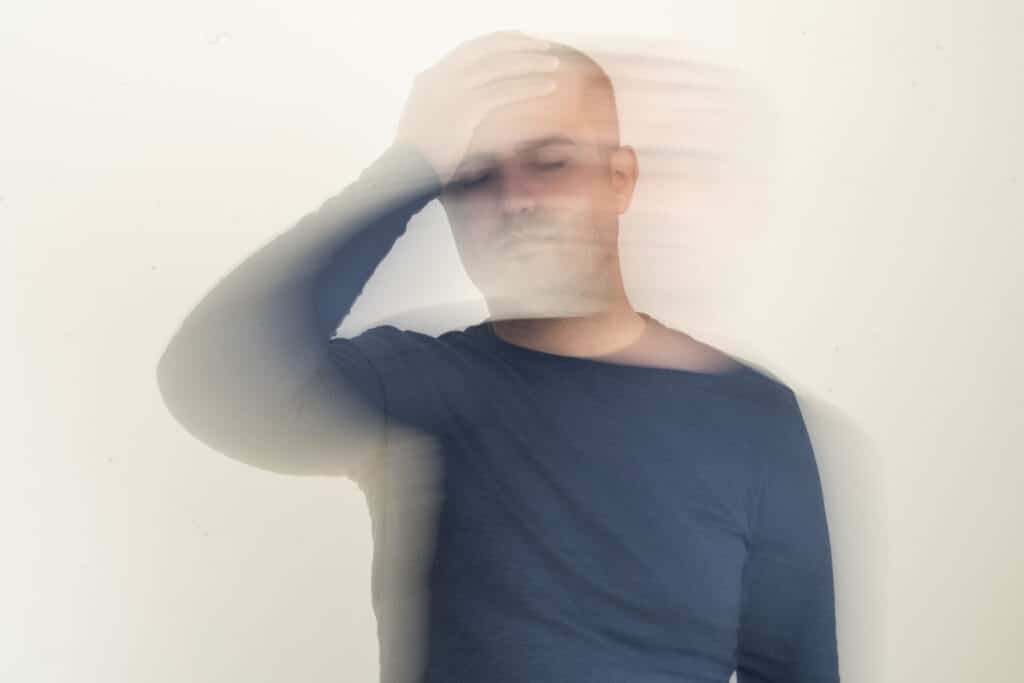Many people feel dizzy when they drink too much alcohol. This is known as vertigo. Vertigo is very dangerous in certain situations, and it can be a sign of a serious health problem. Breaking news — drinking alcohol can cause vertigo and this situation must be taken seriously. You don’t want to put yourself in danger, so check out this quick overview of vertigo, its causes, and how it relates to heavy drinking.

Table of Contents
- 1 What Is Vertigo?
- 2 Why Does Alcohol Consumption Cause Vertigo?
- 3 What Can Go Wrong if You Feel Dizzy While You Drink?
- 4 Does Alcohol Affect Your Hearing?
- 5 Signs That Someone Has a Drinking Problem
- 6 Feeling Dizzy, Disoriented, or Out of Control After Drinking?
- 7 What Is Detox?
- 8 Should You Enroll in a Detox Program?
- 9 How the Addiction Treatment Process Works
- 10 There’s a Better Way To Live Your Life
What Is Vertigo?
Vertigo isn’t a disease on its own. Instead, it’s a symptom of a wide range of conditions. What does vertigo feel like? The common symptoms of vertigo are:
- Poor coordination
- Poor sense of balance
- Nystagmus or shaky vision
- Tinnitus
- Lightheadedness
- Spinning sensations
- Nausea
- Disorientation
Excessive drinking often induces vertigo, and a person who drinks heavily is more likely to feel severe dizziness and awful coordination as they consume more drinks in a single session. Vertigo is also a common symptom of many medical conditions.
While minor conditions such as the common cold, the flu, and ear infections may cause vertigo, this symptom may indicate a problem in the brain, nerves, vestibular system, or inner ear. Vertigo is a common symptom of health conditions like:
- Labyrinthitis
- Vestibular neuritis
- Meniere’s disease
- Upper cervical misalignment
- Alcohol abuse
Thus, if you experience severe, persistent, or sudden vertigo, you should immediately call a doctor.

Why Does Alcohol Consumption Cause Vertigo?
Alcohol is a also diuretic, so it causes your body to expel more water than usual. This is why people frequently urinate and feel dehydrated when they drink. Dehydration affects the inner ear fluid, which can severely affect your balance. Alcohol also has a serious effect on every part of the nervous system.
When a person is healthy and sober, their brain can quickly and easily send clear signals all over the body so that the person can speak, eat, breathe, and move normally. However, alcohol acts as a barrier to these signals and makes it harder for the body to execute basic tasks. As someone drinks more and more, their coordination and balance will worsen.
What Can Go Wrong if You Feel Dizzy While You Drink?
Vertigo, specifically Benign paroxysmal positional vertigo (BPPV), makes a person at risk of falls and injuries. It only takes a short fall to fracture your skull and cause severe brain hemorrhaging. To avoid injury, you should lie down, tell someone how you’re feeling, and avoid stairs and other dangerous obstacles if you feel dizzy.
If you already have a medical condition that causes vertigo, alcohol intake will only worsen it. Stop drinking immediately if you suddenly start to feel vertigo. Even after you stop drinking, vertigo will likely worsen for some time as your body processes the alcohol that’s already in your system.
If someone around you is constantly falling or having extreme difficulty standing up, especially if you suspect the presence of alcohol use disorder, then they should seek medical attention from a healthcare provider as quickly as possible. Since one of the effects of alcohol is poor inhibition, do not drive or operate a motor vehicle under any circumstances if you’re intoxicated or feel dizzy.
Does Alcohol Affect Your Hearing?
Yes, one of alcohol’s effects especially when consumed in large amounts is trouble hearing. Alcohol damages your brain’s auditory cortex and semicircular canals. Short-term effects of this include difficulty perceiving low frequencies and slurred speech.
Individuals who struggle with alcohol addiction can permanently damage the auditory cortex, auditory nerve, and other parts of the nervous system. This may result in long-term difficulty telling voices apart or understanding quick speech. Heavy drinking can also prevent the cells in the ear drum, and inner ear from regenerating will likely cause irreversible hearing loss over time.
Signs That Someone Has a Drinking Problem
Anyone can easily fall into the trap of alcohol abuse. A few beers may seem harmless, but where do you draw the line especially if you suspect alcohol abuse in a loved one? As a person drinks more, they buildup a tolerance and would want to drink more. Until such time that the amount of alcohol induced induced gets way out of control.
The negative side effects of alcohol affect every aspect of a person’s life. If you’re concerned about a loved one having drinking problems, then you should watch out for these signs.

Smell of Alcohol
Some alcoholics function so well when they drink that it’s very hard to tell that they’re intoxicated. However, although their behavior might not give them away, their body’s natural processes will. When a drinker has consumed alcohol, the substance will travel through their bloodstream, and their body will metabolize it.
Consequently, alcohol and its byproducts will make their way into the individual’s sweat and saliva. Thus, although someone might not seem intoxicated, the scent of alcohol on them is a clear sign that they’ve been drinking. If you smell alcohol on a loved one, then you should do everything in your power to keep them from driving.
Irritability
Within 12 hours of an alcoholic’s last drink, they will start to experience early withdrawal symptoms. One of the most noticeable symptoms of withdrawal is irritability. Someone who struggles with addiction might inexplicably have a short temper or seem to be in a bad mood at random times. This usually means that they haven’t had a drink in a while. However, their mood can shift in a matter of minutes, which likely indicates that they’ve finally had a drink.
Poor Memory
After several drinks, a person’s brain will lose its ability to form clear memories. If someone in your life constantly forgets basic things or can’t recall details of your interactions, then there’s a good chance that they’ve been drinking heavily. Regularly drinking to the point of memory loss will eventually cause long-term brain damage and an irreversible form of dementia, so someone with this problem needs help before it’s too late.
Strained Relationships
Heavy drinking can seriously damage a person’s relationships with their friends, family, and romantic partners. Many individuals who struggle with alcohol addiction do or say things that offend their loved ones while they’re under the influence. Moreover, alcoholics often spend a lot of time drinking and neglect their social obligations, which can lead to more social friction.
Unstable Mood
When someone is under the influence of alcohol, they have less control over their emotions. As a person keeps drinking, they’re more likely to cry, act aggressively, or enter a manic state. Individuals who struggle with alcohol addiction sometimes feel intense anxiety or depression between drinking sessions.
Legal Issues
Drinking can cause a person to engage in all kinds of dangerous activities. Many alcoholics habitually drink and drive, which can result in a DUI or a deadly collision. Alcohol makes people do things that could have lifelong consequences, so if someone in your life has trouble controlling their behavior when they drink, you should bring up your concerns and point them toward a high-quality addiction treatment program.
Feeling Dizzy, Disoriented, or Out of Control After Drinking?
Alcohol-related vertigo isn’t just uncomfortable—it can be dangerous. If you’re feeling off-balance physically or emotionally, you’re not alone. At Garden State Detox, we provide compassionate, judgment-free support to help you regain your footing and take control of your recovery.
(855) 958-2436Safe, supportive care is just a phone call away.

What Is Detox?
Detox is the process through which a person’s body readjusts to function without constant doses of an addictive substance. Soon after an alcoholic’s last drink, they will start to experience severe discomfort as they go through drug or alcohol withdrawal. Early withdrawal symptoms include headache, muscle weakness, sweating, anxiety, irritability, and nausea.
These symptoms will worsen until they peak at some point between four days and a week after the last drink. Alcoholics may experience delirium tremens, hallucinations, severe cardiac issues, and other serious problems during the peak stage of the detox process. After the first week of sobriety, symptoms will become much milder as a person’s body adapts to life without alcohol.
Should You Enroll in a Detox Program?
Compared to quitting other substances, alcohol detox is an especially dangerous process. Delirium tremens are marked by sudden and violent seizures. If someone experiences delirium tremens at the wrong time, then they could easily crash their vehicle, hit their head, or have a severe accident. Unfortunately, many people who have gone through alcohol withdrawal without medical supervision have died or suffered severe brain damage.
Thus, it would be best if you considered enrolling in a detox program at a reputable treatment facility for your health and safety. The professionals at an addiction recovery center will quickly respond to any medical emergencies and strive to make your stay as comfortable as possible. Moreover, a detox program increases your odds of success by completely removing you from drugs, alcohol, and other negative influences during the process.

How the Addiction Treatment Process Works
Treatment shouldn’t stop right after the patient makes it through detox. At this critical stage in their recovery, patients still need to develop the right coping mechanisms to sustain long-term sobriety. For this reason, doctors recommend that patients enroll in an inpatient program right after detox. Thus, mental health counseling is a vital part of their program.
In an inpatient program, the patient will live at the facility while they have individual sessions with psychologists, attend group sessions, and participate in a wide range of healthy activities. After some time, the patient will no longer require a full-time stay at the facility. Instead, they’ll stay at home and attend treatment at the addiction center several times per week.
Depending on the patient’s progress, they’ll attend fewer and fewer sessions per week. At some point, the patient and their treatment specialists will decide that sessions at the facility are no longer necessary, so they’ll start attending addiction recovery meetings with a nearby support group instead.
There’s a Better Way To Live Your Life
If you often experience vertigo while drinking, you might have a drinking problem. Vertigo can be very dangerous, and alcohol has many significant long-term health effects. You deserve to be happy, but that’s impossible while you struggle with alcohol addiction.
Thankfully, you don’t have to overcome your addiction alone. The professionals at Garden State Detox want to help you achieve sobriety, so you should reach out today to take your first step toward a better life. Garden State Detox is here to help your loved ones overcome alcohol addiction or substance use disorder live a better life.
FAQ
Why Does Alcohol Make You Dizzy?
Published on: 2022-11-15
Updated on: 2025-06-25


